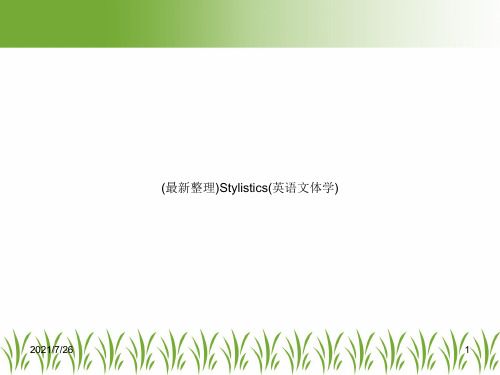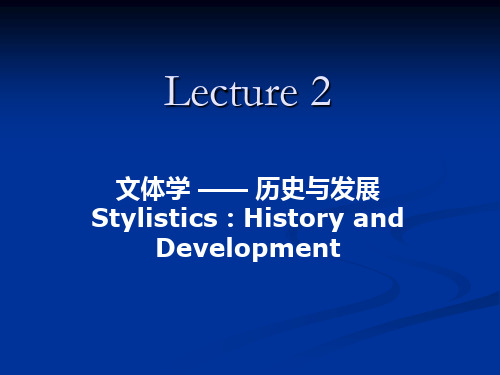Stylistics 6
- 格式:ppt
- 大小:238.00 KB
- 文档页数:28






Chapter One Style and Stylistics•E.g.(1)•“Take an egg, and make a perforation in the base and a corresponding one in the apex. And then, apply the lips to the aperture, and by forcibly inhaling the breath, the shell is entirely discharged of its contents.”•“It fair beats all how folks do things nowadays. When I was a gal, they made a hole in each end and sucked.”•E.g.(2)•(1) My beloved parent has joined the heavenly choir.•(2) My dear father has passed away.•(3) My father has died.•(4) My old man has kicked the bucket.I. Concepts of Style(1) A person’s distinctive language habits, or the set of individual characteristics of language usee.g. Hemingway‟s styleHenry James‟s styleMark Twain‟s style(2). Some or all of the language habits shared by a group of people at one time,or over a period of time.e.g. Elizabethan stylethe style of legal documentthe style of news reporting(3). A characteristic of “good” or “beautiful” literary writings.e.g. ornate styleterse styleplain style(4) Style may refer to the effectiveness of a mode of expression, which is implied in the definition of style as …saying the right thing in the most effective way‟ or …good manners‟, as a …clear‟ or …refined‟ style advocated in most books of composition.Definition of style•we will see some most influential and representative views of style.(英语文体学要略p11)•Style as form. (Aristotle)(form and content )•Style as eloquence.(Cicero)(skill to use language persuasively)(the relation with rhetoric)•Style is the man. (Buffon)•Style as personal idiosyncrasy.(Murry)•Saying the right thing in the most effective way.(Enkvist)•Style as the choice between alternative expressions. (Enkvist)•Style as equivalence. (Roman Jacobson)(between form and function)•Style as foregrounding. (Leech Mukarovsky)•Style as deviation.(Mukarovsky & Spitzer)•Style as prominence.(Halliday)•Style as the selections features partly determined by the demands of genre, form, themes, etc. (Traugott & Pratt)•Style as linguistic features that communicate emotions and thought.(Enkvist)(见教材:P5-7) •Manner indicating prominent linguistic features, devices or patterns, most (or least) frequently occur in a particular text of a particular variety of language.•The manner of expression in writing or speaking which changes at all times according to the actual situational elements, e.g., the participants, time, place, topic, etc, of the communicative event, from very formal to very informal. (见教材P5)•e.g. (After a quarrel between the two lovers)With a flow of words, she started to argue with him, then she checked herself and said calmly, “Listen, John, I imagine you‟re tired of my company. There‟s no sense in having tea together. I think I‟d better leave you right here.”“That‟s fine,” he said. “Good afternoon.”“Good-bye.”•文体的理解虽说众说纷纭,但在当今比较有影响的文体理论主要有三种:把文体看做选择,包括对意义何语言形式的选择;而是变异说,把文体视为变异,即语言在常规的基础上产生的意义及形式的变化;三是突出说,把文体看做突出,或者称为前景化,指特定的语言成分在其他部分或者说是背景的衬托下得到突出或强调。
第六章文体学批评文体(style)与文体学(stylistics)批评⏹文体的概念:广义是指语言中的各种语言变体;狭义指文学文体,包括文学语言的艺术性特征、文本的语言特色或表现风格、作家的语言习惯以及特定的创作流派或文学发展阶段的语言风格等。
⏹文体学是研究各种文体中语言的表达方式和表达效果的一门学科。
广义研究各种问题的语言表达;狭义则集中研究文学文体的语言。
⏹文体学批评:是一种运用现代文体学的理论和方法,从研究文学文本的语言性质、特征入手,对文学文本进行审美把握的批评理论和实践活动。
⏹现代文体学批评的基本特征:以语言分析为本位;具有较强的可操作性;强调客观性和实证性。
韦勒克、沃伦《文学理论》论“文体学”有人试图把文体学仅仅看做语言学的一个分支,但是,文体学不论算不算一门独立的学科,都有自己明确的问题要讨论。
其中的一部分问题看来属于所有(或实际上所有)人类的口语的范畴。
从这一广义出发,文体学研究一切能够获得某种特别表达力的语言手段,因此,比文学甚至修辞学的研究范围更广大。
所有能够使语言获得强调和清晰的手段均可臵于文体学的研究范畴内:一切语言中,甚至最原始的语言中充满的隐喻;一切修辞手段;一切积压法结构模式。
王佐良论文体学研究用现代语言学的方式来研究文体是一个成就,然而在文学语言面前,特别是形象语言面前,语言学家都望而却步了。
……在这种时候,人们不由得不想到那门老的,可以至少上溯亚里斯多德的修辞学,想到在二十世纪对于文学语言进行了精湛分析的文学批评家(I.A. Richards, William, Empsom, CleanthBrooks等人,想到Curtius与Learis等)把刷新文学语言同欧洲或英国文化前途联系起来的有抱负的文学研究者了。
难道这些人的努力都是完全无助于文体学研究的吗?还是要等时间来促成一个既包括语言学又包括文艺学的新的综合呢?本章导航⏹第一节文体学批评概述⏹第二节文体学批评的理论特征⏹第三节文体学批评的操作方法⏹第四节文体学批评评述第一节文体学批评概述一、中国古代的文体学批评二、西方古代的文体学批评三、现代文体学批评的兴起与发展一、中国古代的文体学批评⏹先秦⏹“辞尚体要”、“修辞立其诚”、“辞达而已矣”⏹魏晋六朝⏹“四科八类”(曹丕)、对文体及风格所作的十种归类(陆机)、“四声八病”、《文心雕龙》对文章体例所作的系统分析(刘勰)。
谈论文学要知道哪些英语单词谈论文学要知道哪些英语单词文学是以语言文字为工具,形象化地反映客观现实、表现作家心灵世界的艺术,包括诗歌、散文、小说、剧本、寓言童话等,是文化的重要表现形式,以不同的形式即体裁,表现内心情感,再现一定时期和一定地域的社会生活。
文学就在我们生活里。
但你和外国人谈论文学时,一定要知道下面这些英语单词。
1).author n.作者,作家The author of this novel must be a detective这本小说的作者一定是一个侦探。
2).write v.书写,写作If you miss me, please write letters to me如果你念我,就请给我写信。
3).literature n.文学,文学作品As far as literature is concerned.I am very fond of classics就文学作品而言,我很喜欢古典作品。
4).work n.作品If my memory serves me right, the famous sonnet is Shakespeare's work如果我没记错的话,这首著名的十四行诗是莎士比亚的作品。
5).stylistics n.文体学,风格学Stylistics is a branch of linguistics文体学是语言学的一个分支。
6).poetry n.诗歌,诗集l often recite poetry as possible as I can in my spare time在我有空时,我经常尽可能的多背诗。
7).antithesis n. 对句,对偶The foreign friend is puzzled about the antithesis那个外国朋友看不懂对句。
8).verse n.诗,韵文From whom did you quote these verses?你从谁那里引用了这些诗句?9).ballad n.歌谣,民谣My mother likes ballads while I like pop music我妈妈喜欢民谣,但是我喜.欢流行音乐。